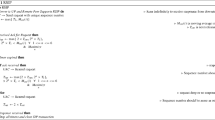Abstract
CORBA is an object-oriented middleware defined by the OMG. It is designed to support the development of distributed applications by separating interfaces from implementations. Unfortunately, CORBA does not consider QoS requirements inherent to new applications such as teleconferencing and telecommunication services. The Resource reSerVation Protocol (RSVP) is an IETF protocol that allows real-time applications to reserve necessary resources at routers along the transmission paths, so the requested bandwidth can be available when transmission actually takes place. In this paper, we discuss the use of Notification Service and RSVP to provide end-to-end QoS to applications supported by CORBA architecture.
Similar content being viewed by others
References
C. Aurrecoechea, A. Campbell and L. Hauw, A survey of QoS architectures, Multimedia Systems 6 (1998) 138–151.
C. Becker, C.K. Geihs and J. Gramberg, Representation of quality of service preferences by contracts hierarchies, in: Proc. of Elecktronische Dienstleistungswiltchatt and Financial Engineering, Augsburg, Germany, 1999.
G. Bollela and J. Gosling, The real-time specification for Java, Computer 33(6) (2000) 47–54.
R. Braden et al., Integrated services in the Internet architecture: An overview, IETF, RFC 1633 (1994).
R. Braden et al., Resource reservation protocol (RSVP), Version 1: Functional specification, IETF, RFC 2205 (1997).
S. Chatterje et al., ERDOS QoS architecture, Technical Report, SPAWARSYSCEN, San Diego, CA (1998).
CORBA messaging, Object Management Group (OMG) Document orbos/98-05-05 (1998).
dCon Users Guide, Distributed System Technology Center (DSTC), University of Queensland (2000).
Event service specification v.1.1, Document formal/01-03-01, Object Management Group (2001).
R. Golapakrishnan and G. Parulkar, Design and implementation of a real time upcall mechanism, Technical Report, Department of Computer Science, Washington University in St. Louis (1996).
P. Gore et al., Designing and optimizing a scalable CORBA notification service, Research Report, Washington University, St. Louis (2001).
M. Henning and S. Vinoski, Advanced CORBA Programming with C++ (Addison-Wesley, Reading, MA, 1999).
H. Kim, APIs for real-time distributed object programming, Computer 33(6) (2000) 72–79.
K. Nahrdest and J. Smith, The QoS broker, IEEE Multimedia Spring 2(1) (1995) 53–67.
Notification service specification, Document formal/02-08-04, Object Management Group (2002).
QoS Protocols and Architectures, White paper, Stardust Inc., California (1998). http://www. qosforum.com.
Real-Time CORBA 1.0-Request for proposal, Object Management Group. Document/Orbos 97-09-31 (1998).
Real-time CORBA 2.0, Dynamic scheduling specification 2, Object Management Group (2001).
B. Selic, A generic framework for modeling resources with UML, Computer 33(6) (2000) 64–69.
S. Shenker, C. Partridge and R. Guerin, Specification of guaranteed quality of service, IETF, RFC 2212 (1997).
S. Shenker and J. Wroclawski, General characterization parameters for integrated service network elements, IETF, RFC 2215 (1997).
S. Sherlia, P. Gurudatta and R. Gopalakrishnan, TCP/IP implementation with endsystems QoS, Technical Report, Department of Computer Science, Washington University in St. Louis (1998).
E. Shokri and P. Sheu, Real-time distributed object computing: An emerging field, Computer 33(6) (2000) 45–46.
The common object request broker: Architecture and specification, Version 3.0.2, Object Management Group, Document formal/02-12-06 (2002).
R. Vanegas et al., QuO's runtime support for quality of service in distributed objects, in: Proc. of the IFIP Internat. Conf. on Distributed Systems Platforms and Open Distributed Processing (Middleware' 98), The Lake District, England, 1998.
H. Wedde, Critical issues in object-oriented real-time systems-A guided panel discussion, Journal of Time-Critical Computing Systems 18 (2000) 69–70.
J. Wroclawski, The use of RSVP with IETF integrated services, IETF, RFC 2210 (1997).
J.Wroclawski, Specification of the controlled-load network element service, IETF, RFC 2211 (1997).
Author information
Authors and Affiliations
Rights and permissions
About this article
Cite this article
Rodriguez, J., Mammeri, Z. & Lorenz, P. CORBA Notification Service and RSVP-Based Architecture to Provide QoS Guarantees. Telecommunication Systems 24, 363–383 (2003). https://doi.org/10.1023/A:1026139502270
Issue Date:
DOI: https://doi.org/10.1023/A:1026139502270




